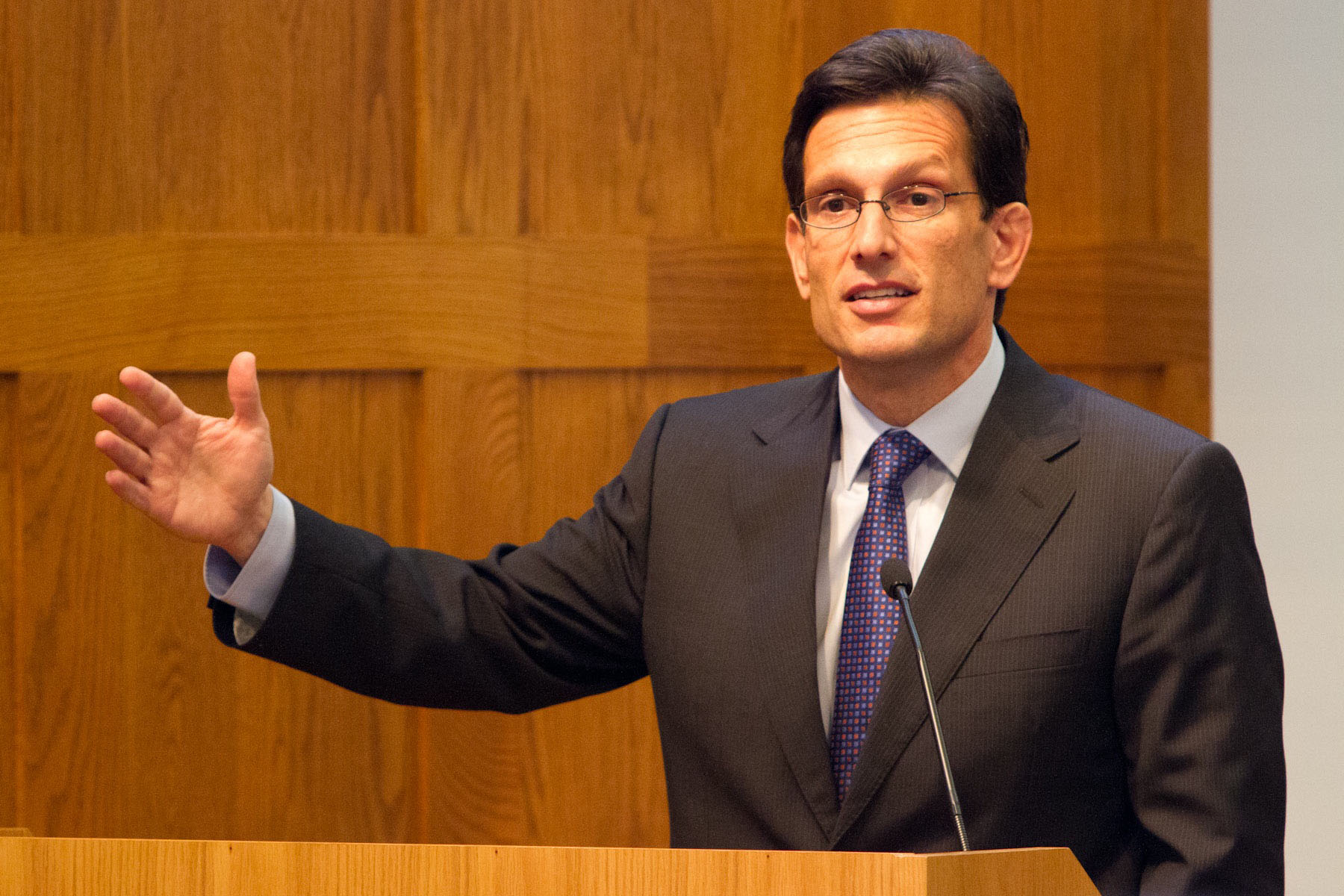April 10, 2012 — U.S. House of Representatives Majority Leader Eric Cantor's vision for America emphasizes a bootstrapping entrepreneurial spirit, as he explained Friday in a speech at the University of Virginia's Frank Batten School of Leadership and Public Policy.
Strong leadership, innovation and creating new businesses are three keys to getting the American economy into better shape, and to America competing successfully in a world economy with fast-rising economic forces like China and India, said Cantor, a Republican who represents Virginia's 7th Congressional District, which encompasses parts of Richmond as well as Louisa, Orange and Madison counties. Those issues will be at the forefront of voters' minds in the November elections, he predicted.
Cantor made it clear that U.Va. has a role to play in all three of those keys to America's future as he spoke to about 80 people – predominantly Batten students – in Garrett Hall's Great Hall.
Cantor addressed the would-be leaders one day after standing next to President Obama as he signed the Jumpstart Our Business Startups Act, which fosters startup businesses by enabling them to raise investment funds through online crowdsourcing and freeing them from some government regulations.
Cantor pointed to the JOBS Act as an example of bipartisanship in a polarized Washington, demonstrating an ability for Republicans and Democrats "to set aside those differences to come together to actually produce results."
America needs strong leadership now as much as ever, he said, and applauded the Batten School's focus on transformational change. "When we're involved in policy discussion, it can be very difficult to even imagine the type of transformational change necessary to lead us out of what seems to be an insurmountable problem," he said.
In contrast to some in the media who call for more "common sense" and less wonky policy debates, "I think common sense comes after all the hard work of investigating the details and being educated on a policy," he said. "That's why I'm so excited to see the Batten School, and its focus on taking University of Virginia students with critical thinking skills and applying those critical thinking skills to the very difficult policy issues of the day."
With more than 13 million people unemployed, "times are tough," and the best way to fix that is by creating new jobs, said Cantor, who noted that the recent government estimate of 120,000 net jobs created last month "fell short of expectations and what is needed."
That means fostering small businesses, which account for 65 to 70 percent of new job creation, he said. In this globalized era when investment capital "knows no borders," Washington's policymakers should follow Virginia's example, promoted by governors and legislators of both parties, and tell the world that America is "open for business" by reducing government regulation, cutting corporate tax rates and reforming the tax code.
"The tax code is way too complex in ways that impede the efficient flow of capital," he said. Getting rid of special tax subsidies and preferences will simplify the code and will level the playing field for business. "When you get a carve-out in the code, it's just like getting a spending handout."
In contrast to promoting entrepreneurial spirit, citizens are becoming increasingly reliant on government, he charged, with 36 percent of people either on the government payroll or receiving government entitlements and more than 45 percent of people who "do not pay anything" in income taxes.
"With the freedom afforded by America, we give people the ability to chase their dream, but it's up to them to go out and earn it," Cantor said.
"We are innovators, inventors, entrepreneurs, risk-takers," he said. "Fundamental to their success is the possibility of failure. And we don't hold it against one if they stand up and try.
"But we must translate that sense into policies that invite a better climate for risk-taking, a better climate for capital investment."
Universities like U.Va. are drivers of innovation and business startups, he said during media questioning after the event. "I know U.Va. is a bastion of innovation, from Thomas Jefferson, and has a real focus now on combining all the forces of research at this university to be an innovation center for the country, if not the world. That's absolutely how we lead in this country – we bring ideas to market better than anyone else."
Cantor's talk was part of the Batten Council Speaker Series, created in 2010, which brings to Grounds "individuals whose life or career showcases leadership in the public policy arena," said graduate student Aaron Chafetz, president of the Batten Council, as he introduced Cantor as someone who has made service to the country his "life's mission."
Past speakers in the series include the late Ted Sorensen, President John F. Kennedy's speechwriter and counselor; and retired Supreme Court Justice Sandra Day O' Connor.
Cantor noted that he is a proud "Wahoo" parent. His eldest son, Evan, is a fourth-year student in the McIntire School of Commerce, and his youngest son, Michael, will enroll this fall.
– by Brevy Cannon
# # #
Media Contact
Article Information
April 10, 2012
/content/uva-cantor-emphasizes-leadership-and-entrepreneurial-spirit

